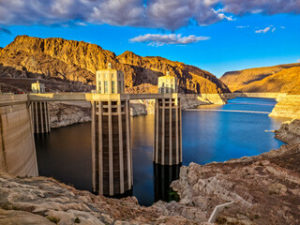

Mac Slavo – August 17, 2022
Low water levels in the Western states are causing a problematic crop yield. But they also impact our energy supply and push the power grid to the brink.
When temperatures rise and water levels drop, the energy sector gets squeezed hard. The consequences of water shortages are playing out now in swaths of the American West, where an expansive, decades-long drought is forcing drastic cuts in hydroelectric power generation. At the same time, exceptional heat has pushed energy demand to record highs.
According to a report by Vox, the flow of water is critical to the flow of electrons and heat. About 40 percent of water withdrawals — water taken out of groundwater or surface sources — in the United States go toward energy production. The large majority of that share is used to cool power plants. In turn, it requires energy to extract, purify, transport, and deliver water.
The United Nations Environment Programme warned this month that if drought conditions persist, the two largest hydroelectric reservoirs in the US — Lake Mead and Lake Powell —could eventually reach “dead pool status,” where water levels fall too low to flow downstream. Lake Mead fuels the Hoover Dam, which has a power capacity topping 2,000 megawatts while Lake Powell drives generators that peak at 1,300 megawatts at the Glen Canyon Dam.
This is all going to compound into a major problem that we are all going to be facing in the coming months, as the cold weather approaches.
“Water supplies for agriculture, fisheries, ecosystems, industry, cities, and energy are no longer stable given anthropogenic climate change,” Camille Calimlim Touton, commissioner of the Bureau of Reclamation, told Congress in June.
Almost all crops are under a threat of a horrifically low yield. A lack of water and extreme heat is making farming incredibly difficult, if not impossible.